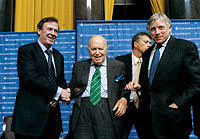|
|
 |
 |
|
AROUND THE QUADSKluge Pledges $400 Million for Financial AidBy Alex Sachare ’71 

From left, Dean Austin Quigley congratulates John Kluge ‘37 at the April 11 announcement of his record gift, as President Lee C. Bollinger looks on. Photo: Eileen Barroso  John Kluge ’37 has pledged $400 million to the University to be used for financial aid, half for College students and half for undergraduates and graduate students in other schools. It is the largest gift ever devoted exclusively to student aid and the fourth largest ever to any single institution of higher education in the United States, according to the Chronicle of Higher Education. The gift will gradually enable the College to enhance its financial aid packages by offering more grants in place of loans. “John’s extraordinary gift, coupled with his earlier gifts, will help generations of Columbians,” said President Lee C. Bollinger at a ceremony in Low Library on April 11 at which other speakers included Dean Austin Quigley, Mayor Michael Bloomberg, Rep. Charles Rangel (D-N.Y.) and trustee Joan Spero ’68 SIPA, ’73 GSAS. Former New York City mayor and SIPA Professor of Professional Practice David N. Dinkins also attended. Kluge Scholars Denise De Las Nueces ’03 and Ronald Towns ’08 thanked Kluge on behalf of approximately 500 current and former Columbia students who have been able to attend the College because of Kluge’s past donations to a scholarship program for under-represented students. Kluge, 92, spoke of being in awe the first time he saw Low Library, when he arrived on campus in 1933. “I was a country bumpkin when I got here; some say I’m still a country bumpkin,” he joked. “I was the beneficiary of a scholarship here, and this institution made me a better person. I want other young people to benefit from this institution as I did.” Kluge called his gift “a drop in the bucket” because the needs of the University are so great, to which Bollinger responded, “It is not a drop in the bucket; it is a huge, huge thing. Columbia loves you and appreciates what you have done.” The gift, which will be made through Kluge’s estate and brings his giving to the University to more than $500 million, comes in the first year of the $4 billion Columbia Campaign. With his commitment, the University reached $2.2 billion in the fundraising campaign, 55 percent of the overall goal. Kluge, who graduated from the College 70 years ago, described the impetus for his gift by saying, “I want to help ensure that Columbia will always be a place where the best and the brightest young people can come to develop their intellect, make something of their own lives and give something back to our communities, our country and our world.” Columbia recently announced it would begin the process of enhancing undergraduate financial aid in the fall of 2007 by replacing loans with grants for incoming College and SEAS students whose families earn less than $50,000 per year. When it becomes effective, the Kluge gift will allow Columbia to further enhance scholarship and fellowship aid across the University. Quigley, who got to know Kluge before joining Columbia in 1990, described the delight Kluge takes in broadening opportunities for others and also the impact of his helping students this way: “First, if loan burdens are very high, students from low-income families are discouraged from applying. Second, students who enroll at Columbia need to have full access to the educational and social experience we offer. That’s difficult if their loan burden is mounting every year, and they feel the pressure to devote more time to earning money. Third, we need to ensure that graduates have access to a full range of careers. Students graduating with $20,000 in loans are less likely to choose low-salary careers, even if that is where their sense of personal fulfillment and public responsibility would otherwise direct them. Providing more financial aid grants and fewer loans is vital if our full-need financial aid policy is to achieve its traditional goals. That is why this gift is so important to the future of the College.” One key goal of such aid is to open Columbia’s doors to all students on the basis of their talents, not their ability to pay the cost of attendance. “Columbia has long enrolled one of the most diverse student bodies in the Ivy League. We take great pride in that tradition, we are committed to its continuation, and John’s remarkable gift will ensure it defines the character of our institution for the long term,” Quigley said. This is a tradition from which everyone benefits, he added. “Students learn a lot from each other, so a socio-economically diverse student body is a resource for everyone. In that sense, all students benefit from financial aid, whether or not they receive such aid.” De Las Nueces, who is in Harvard Medical School, spoke movingly about how being admitted to Columbia, and being able to accept because she received a Kluge scholarship, had changed her life. And Towns, who recently won a prestigious Truman Scholarship for graduate study, drew cheers when he said he planned to teach in New York City’s public schools as a way of giving back. For more about Kluge, see CCT’s November 2004 cover story.
|
|
||||||||||||||||||||||||||||